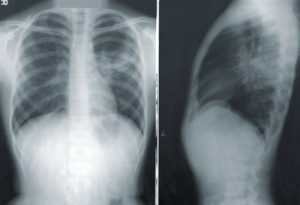Misleading Study Links Vaping to Wheezing When the Research Itself Shows Otherwise
A newly-published study by researchers at the University of Rochester and the Roswell Park Comprehensive Cancer Center concluded that vaping is associated with increased risk of wheezing and related respiratory symptoms, when the evidence provided in the actual only suggests that wheezing is a symptom of current or past tobacco smoking.
 Researchers used multivariable logistic and cumulative logistic regression models to make a cross-sectional association of vaping with self-reported wheezing on a sizeable sample of 28 171 adults who participated in the 2014-2015 Population Assessment of Tobacco and Health study. Among the participants 641 (1.2%) were current vapers who used e-cigarettes exclusively, 8525 (16.6%) were current exclusive smokers, 1106 (2.0%) were dual users and 17 899 (80.2%) were non-users. After analyzing and comparing the data for all these separate groups, the team of scientists concluded that vaping was associated with an increased of wheezing and other respiratory symptoms.
Researchers used multivariable logistic and cumulative logistic regression models to make a cross-sectional association of vaping with self-reported wheezing on a sizeable sample of 28 171 adults who participated in the 2014-2015 Population Assessment of Tobacco and Health study. Among the participants 641 (1.2%) were current vapers who used e-cigarettes exclusively, 8525 (16.6%) were current exclusive smokers, 1106 (2.0%) were dual users and 17 899 (80.2%) were non-users. After analyzing and comparing the data for all these separate groups, the team of scientists concluded that vaping was associated with an increased of wheezing and other respiratory symptoms.
After adjusting for age, gender, race/ethnicity, body mass index, secondhand smoke exposure and other factors, researchers concluded that adult vapers were 1.7 times more likely to suffer from wheezing and related respiratory symptoms, like breathing difficulties, when compared to non-users who had never smoked.
“The take-home message is that electronic cigarettes are not safe when it comes to lung health,” Deborah J. Ossip, Ph.D, co-author of the study, said in a press-release. “The changes we’re seeing with vaping, both in laboratory experiments and studies of people who vape, are consistent with early signs of lung damage, which is very worrisome.”
Lead study author Dongmei Li, Ph.D., associate professor in the Department of Clinical and Translational Research at URMC, admits that the research has several limitations, the most important one being that the cross-sectional analysis cannot prove that vaping causes wheezing, but only make an association between the two. Also, because the data for the Population Assessment of Tobacco and Health study is self-reported, it can be influenced by personal bias. Finally, the data doesn’t take into account other possible causes for wheezing, like physical activity levels, diet, etc..
Still, the researchers make it very clear in their conclusion that based on their work, vaping is associated with wheezing, which is indeed worrisome, especially for those of us who actually vape. Well, I personally take this sort of studies very seriously, so I was curious to know what exactly these scientists found that led them to this dire conclusion. So here are the results:
– Compared with non-users, risks of wheezing and related respiratory symptoms were significantly increased in current vapers;
– Current vapers had significantly lower risk in wheezing and related respiratory symptoms compared with current smokers;
– No significant differences were found between dual users and current smokers in risk of wheezing and related respiratory symptoms;
Is it just me or should the conclusion of this study be “Vaping Is Associated with Wheezing in Adults Who Previously Smoked Cigarettes”? If the data clearly shows that the risk of wheezing is “significantly lower” in vapers compared to both current smokers and dual-users, could it be possible that the wheezing risk in people who exclusively vape is caused by their former smoking habit? The vast majority of vapers are former smokers, and while this study clearly shows that switching to vaping lowers smokers’ risk of wheezing and related respiratory symptoms, it’s worth keeping in mind that it doesn’t miraculously heal the damage done by years of smoking tobacco.
And even if there was some way to prove that the increased risk of wheezing in current vapers compared to non-vapers has nothing to do with previous tobacco smoking, it’s still weird to me that these researchers choose to focus on the negative instead of pointing out the lower risk of vaping compared to smoking? If they had only changed the conclusion and left the study and results exactly the same, this would have been a positive study on vaping. Well, it still is, in my opinion, but it would have been nice for the researchers to acknowledge that. As it stands, most people who read it and the articles doing the rounds on the internet will take away the notion that vaping increases the risk of wheezing and difficulty breathing.
The true tragedy here is that vaping is considerably less harmful than smoking, but we’re doing everything we can to scare smokers away from it, leaving them the choice of other continuing to smoke tobacco or quit cold turkey or with nicotine replacement therapy. Like those worked so darned well before the invention of the e-cigarette…

















Thanks for this analysis. I’ve recently started vaping and so I’ve also started paying more attention to the risks of vaping. When I originally saw the results of this study I basically accepted it for what it claimed to be, while also figuring that vaping had enough positives over smoking so that the results were not too worrisome. Another article I read recently had an alarming headline about mystery chemicals in vape having potentially catastrophic consequences. The first paragraph made fun of flavor options. The second paragraph concluded that vaping does not help people quit smoking but it does help non smoker become smokers. The conclusion was that since vaping is somewhat new there have never been long term studies on the consequences and therefore you should be scared of vaping.
The best one I’ve seen so far – after prolonged exposure to vape, over a month, human cells had some damage. This was reported as evidence of danger, though no comparison could be made to the consequences of smoking because the cells died an hour after exposure to cigarette smoke. This info was seemingly meant to be buried.
I’m glad you found my article helpful, thanks for stopping by. All I’m trying to say is that we should stop comparing vapers to non-users/non-smokers, it’s clear to everyone that not putting anything but fresh air into your lungs is the best things anyone can do. But quitting cold turkey isn’t that easy for everyone, so why not take a harm-reduction approach, at least until we come up with an even better alternative to smoking. These days, everyone is just bashing vaping like it’s just as bad or even worse than smoking, when the scientific evidence clearly shows otherwise.